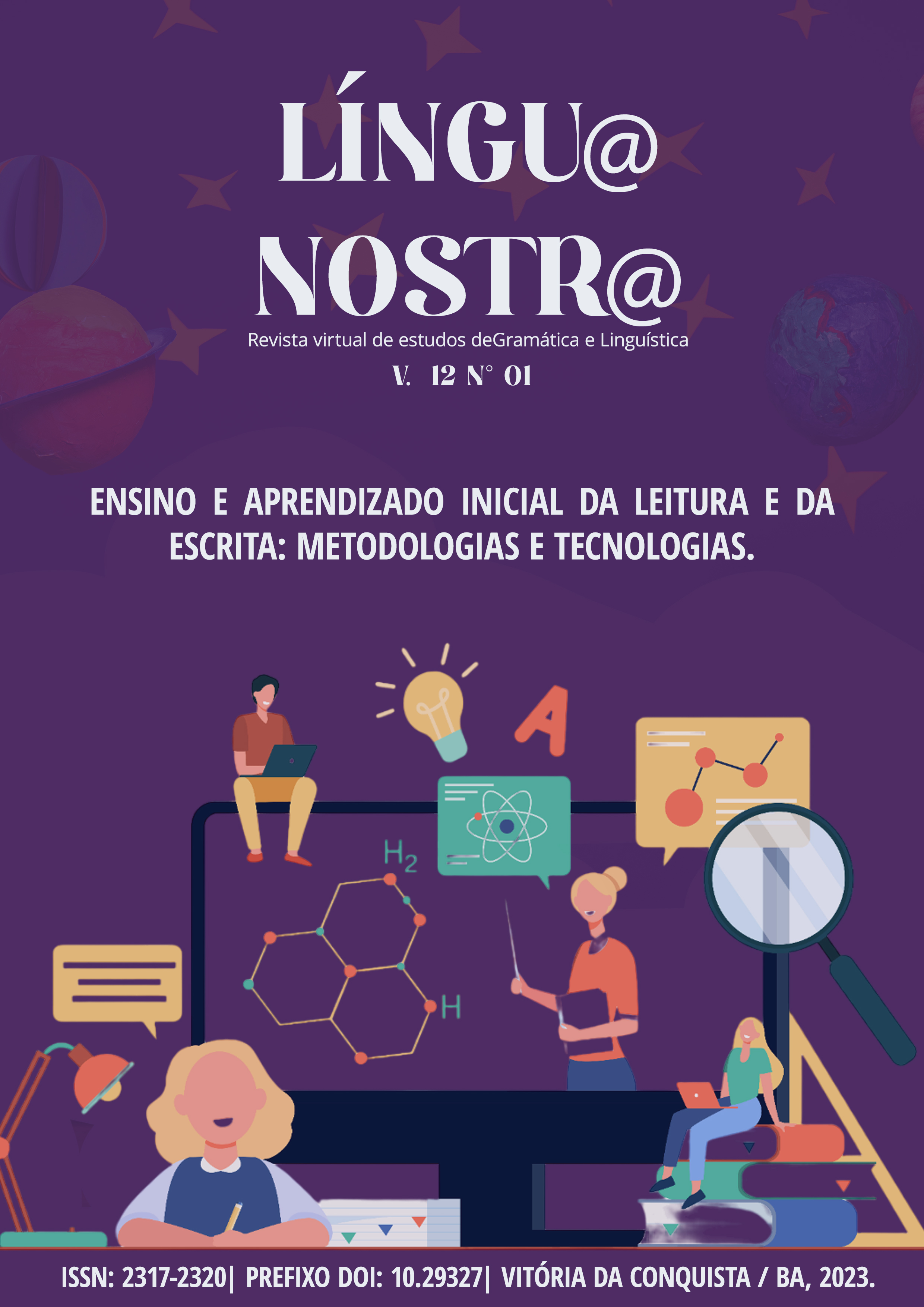Orality, reading and textual production in the perspective of dialogical review from the discursive genre song for 3rd year students of high school
DOI:
https://doi.org/10.22481/lnostra.v12i1.14751Keywords:
Class proposal, Dialogism, Bakhtin Circle, Orality-reading-writingAbstract
In this article, carried out in the context of Applied Linguistics in the context of the mother tongue, we present a proposal for a class aimed at the 3rd year of high school, whose priority is to approach orality, reading and writing in a dialogic way so that everyone have the opportunity to participate in the construction of meaning of the text. Therefore, we aim to share a practical and contextualized alternative of teaching in the light of the conceptions of dialogic relationships, valuation and intonation present in the works of the Bakhtin Circle. For this activity, we propose the use of the discursive genre song and the work “O meu guri”, by Chico Buarque, as it allows the analysis of deep social themes when exploring its various possibilities of meaning that can be expressed through the orality- read-write. Throughout the five stages designed for the development of the activities that make up the lesson proposal in question, students will be able to: 1) read and interact with the lyrics of the song in different ways; 2) interact with the text through evaluation; 3) be directed to produce a text; 4) practice revision and rewriting; and 5) have their text returned to them with the teacher's comments for improvement. The planning of these stages focuses on the exploration of a discursive genre with the aim of implementing effective activities that enable students to move away from the position of simply repeating knowledge and begin a meaningful interaction with the text.
Downloads
References
ANTUNES, Irandé. Aula de Português: encontro e interação. São Paulo: Parábola, 2003.
BELOTI, Adriana et al. Conceito de valoração em perspectiva enunciativo-discursiva: proposta teórico-metodológica para a prática de leitura. In: FRANCO, Neil; PEREIRA, Rodrigo Acosta; COSTA-HÜBES, Terezinha da Conceição (orgs.). Estudos dialógicos da linguagem: reflexões teórico-metodológicas. Campinas, SP: Pontes Editores, 2020.
BUARQUE, Chico. O meu guri. Produzido por Marco Aurélio da Silva Mazzola. São Paulo: Ariola Discos; Polygram Discos Ltda., 1981. LP.
FERREIRA JUNIOR, Edson Gomes; FORTE-FERREIRA, Elaine Cristina. O espaço da oralidade na escola: uma análise da base nacional comum curricular. In: FORTE-FERREIRA, Elaine Cristina; LIMA-NETO, Vicente de (orgs.). Oralidade e (multi)letramentos no ensino de línguas. São Carlos: Pedro e João Editores, 2020.
FUZA, Ângela Francine; OHUSCHI, Márcia Cristina Greco; MENEGASSI, Renilson José. Concepções de linguagem e de leitura no ensino de língua materna. Linguagem e ensino. Pelotas, v. 14, n.2, p. 479-501, jul./dez. 2011.
JAQUES, Michel; KUEHN, Teresinha Giovanella. A linguagem musical no ensino da literatura e na interpretação de textos líricos. Maiêutica – Estudos Linguísticos, Literários e Formação Docente, Blumenau, ano 1, n. 1, p. 65-71, jan. 2013. Disponível em: https://core.ac.uk/download/pdf/228914174.pdf. Acesso em: 16 mai. 2023.
MENEGASSI, Renilson José. Comentários de revisão na reescrita de textos: componentes básicos. Trabalhos em Linguística Aplicada, Campinas, 2000.
MENEGASSI, Renilson José. Da revisão à reescrita: operações e níveis linguísticos na construção de texto. 291 f. Tese, Doutorado em Letras, Universidade Estadual Paulista Júlio de Mesquita Filho, Assis, 1998.
MENEGASSI, Renilson José. Leitura e construção de sentidos no livro didático. Revista Pedagógica, [s.l.], v.3, n. 7, p. 121-140, jul./dez. 2001.
MENEGASSI, Renilson José; CAVALCANTI, Rosilene da Silva de M. Conceitos axiológicos do dialogismo em propaganda impressa. In: FUZA, Ângela Francine; OHUSCHI, Márcia Cristina Greco; MENEGASSI, Renilson José. Interação e escrita no ensino de língua. Campinas, SP: Pontes Editores, 2020.
MENEGASSI, Renilson José; GASPAROTTO, Denise Moreira. Revisão dialógica: princípios teórico-metodológicos. Linguagem em (Dis)curso – LemD, Tubarão, SC, v. 19, n.1, p. 107- 124, jan./abr. 2019.
MORAES, J. J. de. O que é música. 7. ed. São Paulo: Brasiliense, 2008.
ROCHA, Silvio Rodrigo de Moura. Canção: um gênero intersemiótico para educação estética. Guará, Goiânia, v. 8, n. 1, p. 81-95, jan./jun. 2018. Disponível em: http://seer.pucgoias.edu.br/index.php/guara/article/download/6507/3836. Acesso em: 11 mai. 2023.
VOLÓCHINOV, Valentin. A palavra na vida e a palavra na poesia: para uma poética sociológica. In: VOLÓCHINOV, Valentin. A palavra na vida e a palavra na poesia: ensaios, artigos, resenhas e poemas. Organização, tradução, ensaio introdutório e notas de Sheila Grillo e Ekaterina Vólkova Américo. São Paulo: Editora 34, 2019 [1926].
Downloads
Published
How to Cite
Issue
Section
License
Copyright (c) 2024 Língu@ Nostr@

This work is licensed under a Creative Commons Attribution 4.0 International License.






